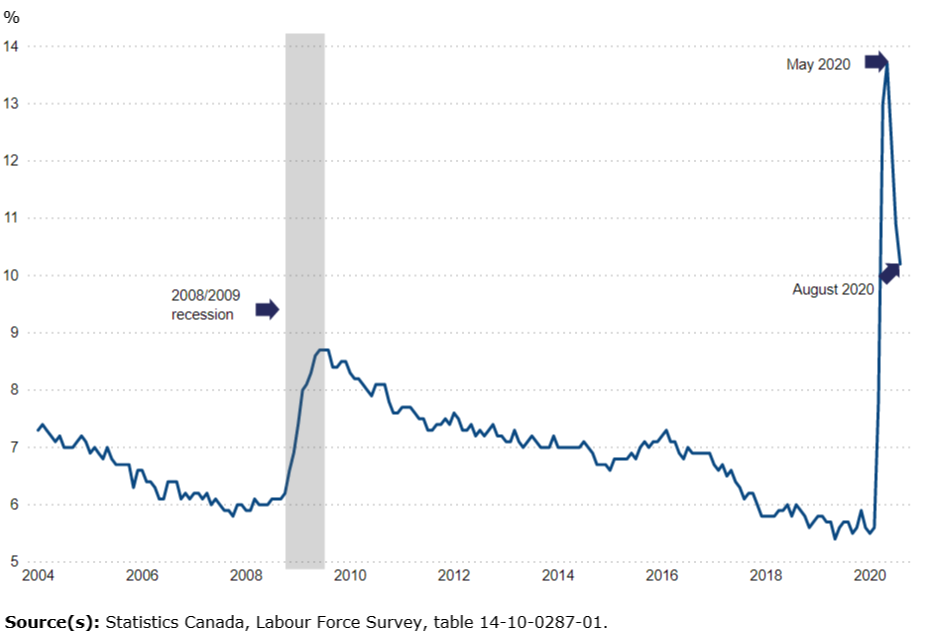Looking at the unemployment rate over the last 15 years is like looking at a cardiogram. Some clear peaks and valleys and fairly regular blips in between are visible. But we haven’t seen anything like this ‘heart attack’ to employment in generations. With unemployment hitting 13.7% in May, nothing has been on Canadian’s minds quite like the stability of their jobs. A strong employment rebound is finally underway. Thankfully, businesses are able to open up again. That said, we still have a long way to go to get to pre-COVID employment levels. Whether you’re in a role now or looking for a new one, it’s clear that the rules have changed. There’s a new executive search reality in place right now.

In order to gauge market momentum for marketers in Canada, In Partnership With decided to go straight to the source. For over 15 years, Andrew Gartha, Vice President of Mandrake Human Capital, has been working with leading blue chip organizations working with both clients and agencies. Today, Andrew is the ‘doctor on call’ for interpreting the latest cardiogram to advise on next steps.
Job Security While WFH
For those who remain employed, nothing changes. You need to do your job as best as possible (or even better than pre-COVID). You need to continue to provide the best performance possible under the circumstances. It’s a little bit more complicated in the sense that everybody’s working from home. Today, the ability to influence decisions by your boss, peers or management is challenging due to WFH. New employees hired by an organization are at an even greater disadvantage.
Nobody is safe because every company is going through their org chart to see who’s absolutely essential and who’s not.
The work from home challenge can be a big aspect to your work-related anxiety. Before, if you were worried about your job security, you could make some inquiries or you could build alliances. These could be with either your boss, co-workers or senior management during an in-person meeting, or over a coffee. That has now gone by the wayside. Therefore, people should not be complacent. You may still be cut in the next three to six to nine months. Prepare now.
Prepare for an Executive Search
Leverage LinkedIn to prepare for any eventuality. Your LinkedIn profile should be up to date, including a very good picture. Often you’ll see people put up pictures of themselves that are bordering on inappropriate or just really poorly done. That doesn’t reflect well on the candidate because it just shows that you’re not really paying attention to your brand. Next, if your profile is incomplete or not expansive enough about exactly what you actually do (or did) and your achievements, update the information.
The second part is resumes. Again, more so than any other time, your resume should be professional. It should be up to date and proof-read by other people who can give you an objective perspective.
Networking is Harder Now
Depending on your schedule, many of us are a little bit more flexible in our time because we’re not spending as much time commuting. Or our lives may not be as crazy as they were before. Regardless, you have to carve out certain amount of time every day to build or continue to maintain those relationships with people in your network. Whether they are business friends or clients or other people that you’ve been in contact with, don’t let these lapse.
It’s imperative that your professional networks remain healthy.
Depending on the sector or vertical that you’re in, there are trade associations providing virtual networking services. Leverage these. If you don’t belong, you should belong …starting now. It’s a key thing that every association in Canada and the US is doing. Virtual calls help to keep people engaged, and people should belong to those associations to keep their networks alive and healthy.
For Those Unemployed Right Now
Unfortunately, there is a perception that those without work currently may be less desirable candidates when in an executive search. Although, if you go back to the recession of a decade ago, hiring managers and HR realized that due to the economic downturn, employees were re-structured and downsized through no fault of their own. It was a purely an economic decision. Typically, organizations look at the highest earners and determine if responsibilities can be shifted to others or those earning less.
The more senior you are in an organization and the higher your income, the more you are a target.
People need to have a really airtight alibi in any case. This alibi should specifically outline exactly what were the reasons of their departure. You should think about who within your organization and those you work with closely outside the organization would be a strong reference and advocate for you. Also, these people should verify the reason(s) for your departure. So as long as those reasons are logically presented and explained as part of an executive search, the bias should not be there.
Landing Again Will Take Longer
The timeframe to land is going to be extended versus what was seen in the last three to five years when the economy was doing well. Typically, if you were at a Director or VP level, it could take six or eight months before you landed somewhere in a similar position.
Because of the pandemic and the uncertainty (it’s not over and it will continue into the spring or summer of 2021), the expectation time to land has just been elongated. People understand that there is a certain point, particularly if someone doesn’t land, that it can become more problematic. In general, the timeframe has clearly been extended by at least six or eight extra months, if not a bit longer.
What to Do Now to Stay Attractive to Employers
The most important thing is everyone should look at their skills and particularly how they relate to the future. We know that digital data, artificial intelligence, mobility and other technologies are going to be even more pronounced, regardless of the business that you’re in. You have to look at your own skills as an executive search candidate and say, “Am I really prepared today for the next three to five years?”
It doesn’t necessarily mean hard skills, either, which is where most people start. It could be writing skills, it could be presentation skills, it could be financial analysis skills. Whatever position you’re in, none of us are a 10 out of 10. We’re all lacking something in our experience toolbox. This is a time to invest in your skills since everything is online. There is a plethora of courses offered by universities, community colleges, private institutions and associations.
This is a time when people really have to invest in their future.
Those who are continuing to learn and continuing to invest in their education are more likely to be protected in a downsizing or restructuring than someone who hasn’t been any kind of ongoing education. It’s just logical that people that are willing to invest in themselves are going to be more likely to be kept by a company than someone who’s not.
Keeping Healthy for Your Executive Search
What’s often overlooked in the search process is the physical and mental fitness of prospective leaders. We know that everyone suffers stress because of finances, your children and other factors. Or, because of the uncertainty about kids being back at school.
People need to think about this more than ever and make the most of their free time. On the plus side, many are not spending an hour or an hour and a half in the car each day. That time should be spent walking or bicycling or anything to keep up mental health and your body’s health.
Know Your Employment Rights
This is critical and often overlooked. All employees from being a junior to the most senior in an organization should be aware of their employment rights, whether you’re facing downsizing, restructuring or any other change in your employment status. And you need to know this information before you are re-structured, downsized, furloughed or fired.
Everyone can do their research online, or even speak to an employment lawyer, just to understand what your rights are.
If you haven’t done that, you should do so, particularly for the more senior individuals. Those with a longer tenure in an organization are likely more vulnerable today since they have significantly higher incomes, bonuses and perks. During a major economic disruption, nobody is safe.
Considering an Offer
For those who are considering an employment offer, be really comfortable with the terms – understand your rights as an employee and know what the broad parameters are to protect yourself. That said, don’t over-negotiate or be inflexible to certain employment terms offered by your future employer.
Generally, over the past 6 months, we have seen that salaries have come down, bonuses may be cancelled or reduced significantly for several years and companies can’t afford to provide perks like they did. Remember: you are an employee regardless of your seniority and while you have certain rights and you can and should negotiate – it the employer who sets the framework for employment – not you. Plus, with more candidates in the marketplace, employers have more choice. If you don’t want to play ball with your future employer, there are those candidates next in line who are more than happy to take the employment offer.
As we all move forward together, it’s worth remembering the ‘employment cardiogram’ is not just a set of statistics. It’s people behind each of those percentage points. One way or another, when working together, we’ll get our economy back to full health.
In Partnership With
Andrew Gartha, Vice President of Mandrake Human Capital, has been working with leading blue-chip organizations to attract the best talent. For over 15 years, Andrew has worked with a wide variety of clients from digital start-ups, marketing driven companies, banks to loyalty and CRM driven organizations to a wide range of large and small advertising & communications agencies from pure digital, fully integrated and media buying agencies. Prior to entering the executive search business, Andrew held senior positions with leading marketing agencies in Canada & Europe.
Tim Bishop, CM is a multi-disciplined executive with a proven record of optimizing strategic efforts to expand the influence of leading organizations, such as the Canadian Marketing Association, Cineplex Entertainment, Lavalife.com, IMI International and Northstar Research Partners. In Partnership With is his latest focus to curate Canadian marketing experts to celebrate the power of strategic partnerships in a perspective-based content series.

